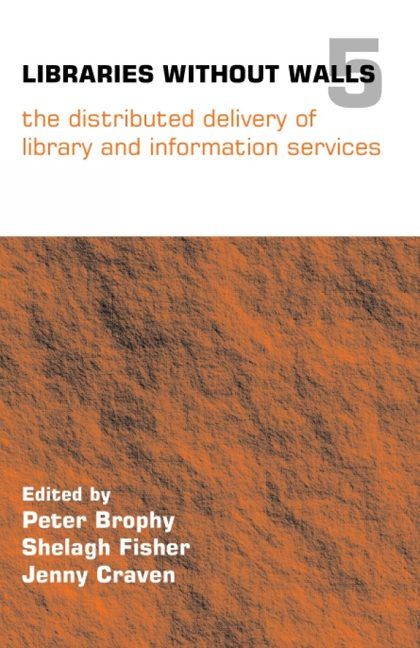Book contents
- Frontmatter
- Contents
- Contributors
- 1 Introduction
- 2 Keynote paper: beyond the mainstream of library services
- THEME 1 THE INTEGRATION OF LIBRARY SERVICES AND VIRTUAL LEARNING ENVIRONMENTS
- THEME 2 THE RELATIONSHIP BETWEEN USER NEEDS, INFORMATION SKILLS AND INFORMATION LITERACIES
- THEME 3 USABILITY AND ACCESSIBILITY OF DIGITAL LIBRARY SERVICES
- THEME 4 DESIGNING THE INFORMATION ENVIRONMENT: NATIONAL AND INSTITUTIONAL PERSPECTIVES
- THEME 5 THE CREATION OF DIGITAL RESOURCES BY USER COMMUNITIES
- 21 Cultural Objects in Networked Environments (COINE)
- 22 The DAEDALUS project: an open archiving initiative
- 23 Librarians in digital communities of practice
- 24 X4L: Exchange for Learning
- Index
- Miscellaneous Endmatter
- Miscellaneous Endmatter
- misc-endmatter
- Miscellaneous Endmatter
22 - The DAEDALUS project: an open archiving initiative
from THEME 5 - THE CREATION OF DIGITAL RESOURCES BY USER COMMUNITIES
Published online by Cambridge University Press: 08 June 2018
- Frontmatter
- Contents
- Contributors
- 1 Introduction
- 2 Keynote paper: beyond the mainstream of library services
- THEME 1 THE INTEGRATION OF LIBRARY SERVICES AND VIRTUAL LEARNING ENVIRONMENTS
- THEME 2 THE RELATIONSHIP BETWEEN USER NEEDS, INFORMATION SKILLS AND INFORMATION LITERACIES
- THEME 3 USABILITY AND ACCESSIBILITY OF DIGITAL LIBRARY SERVICES
- THEME 4 DESIGNING THE INFORMATION ENVIRONMENT: NATIONAL AND INSTITUTIONAL PERSPECTIVES
- THEME 5 THE CREATION OF DIGITAL RESOURCES BY USER COMMUNITIES
- 21 Cultural Objects in Networked Environments (COINE)
- 22 The DAEDALUS project: an open archiving initiative
- 23 Librarians in digital communities of practice
- 24 X4L: Exchange for Learning
- Index
- Miscellaneous Endmatter
- Miscellaneous Endmatter
- misc-endmatter
- Miscellaneous Endmatter
Summary
Introduction
Access to research materials on our campuses is dictated and constrained by the increasing cost of journals, publishers licensing arrangements and the allocation of copyright in that research to publishers. The advent of electronic journals has not increased access to research. In many cases access has, in fact, diminished, as institutions cancel hard copy holdings to subscribe to electronic journals. These are then only available to the staff and students of that institution, and often not available from off-campus locations, thereby disadvantaging the distance learner. The increasing cost of journals is often borne by institutions at the expense of provision of other materials, notably provision of monographs, to undergraduates.
The DAEDALUS (Data Providers for Academic E-content and the Disclosure of Assets for Learning, Understanding and Scholarship) project is one of a number of projects that aims to widen access to the research produced within higher education in the United Kingdom, to communities both within and without the higher education sector, by setting up open archives of that research.
The DAEDALUS project has been funded by the Joint Information Systems Committee (JISC) for three years, to set up open and freely available digital collections of the research output of Glasgow University, one of the Russell Group of research institutions in the United Kingdom. DAEDALUS is not being set up in isolation. Many institutions in the US, Europe and, increasingly, the UK are setting up institutional repositories, and protocols are being developed to enable users to cross-search these archives.
The DAEDALUS project will use three different types of software: GNU EPrints, DSpace and Virginia Tech Electronic Theses and Dissertations (ETDdb) to create collections of published and peer-reviewed articles, pre-prints and grey literature, and electronic theses. Although the technical issues surrounding the establishment of these services will be investigated, the main thrust of the project is to advocate changes to the production and dissemination of scholarly output, and to persuade researchers to make their research available to communities beyond the relatively small number with access to academic journals.
- Type
- Chapter
- Information
- Libraries Without Walls 5The Distributed Delivery of Library and Information Services, pp. 227 - 237Publisher: FacetPrint publication year: 2004



